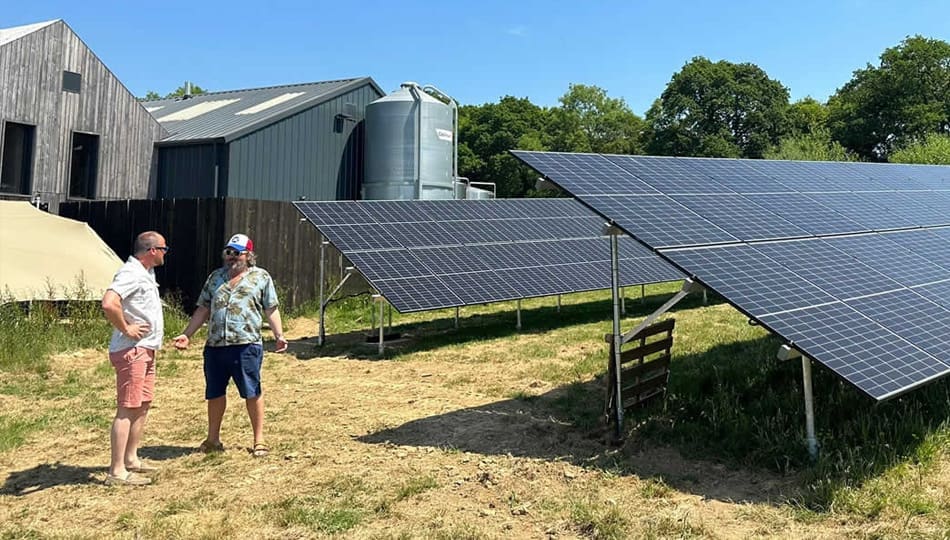
Abstract
The commercial solar energy sector in the UK has seen substantial growth over the past decade. With increasing concerns over climate change, rising energy costs, and government incentives, businesses are increasingly turning to solar energy to meet their power needs. This whitepaper explores the current state of the commercial solar industry in the UK, including market trends, financial incentives, technological advancements, and the regulatory landscape. It also identifies the challenges faced by the sector and provides recommendations for businesses considering investing in solar energy.
Introduction
The transition to renewable energy sources is a critical component of the UK’s strategy to achieve net-zero carbon emissions by 2050. Solar energy, with its abundant potential and declining costs, is at the forefront of this transition. For commercial entities, solar energy offers not only a pathway to sustainability but also significant economic benefits.
Current State of the Market
The UK solar market has grown substantially, with installed capacity increasing from 0.1 GW in 2010 to over 13 GW by 2020. Commercial solar installations account for a significant portion of this capacity. Businesses across various sectors, including manufacturing, retail, and services, are adopting solar energy to reduce their carbon footprint and energy costs.
Technological innovations have played a crucial role in the growth of the commercial solar sector. Advances in photovoltaic (PV) technology have increased the efficiency and reduced the costs of solar panels. Energy storage solutions, such as lithium-ion batteries, are also becoming more affordable, enabling businesses to store excess solar energy for use during periods of low sunlight.
The regulatory environment for commercial solar in the UK is supportive but complex. Key regulations include:
Financial Barriers
Despite the economic benefits, the initial capital cost of solar installations can be a barrier for some businesses. Access to finance can be challenging, particularly for small and medium-sized enterprises (SMEs).
Regulatory and Bureaucratic Hurdles
The process of obtaining the necessary permits and approvals can be time-consuming and complex. Businesses often face delays and additional costs due to regulatory requirements.
Grid Capacity and Infrastructure
The UK’s grid infrastructure is not always equipped to handle the intermittent nature of solar power. In some areas, grid capacity constraints can limit the ability to connect new solar installations.
Technological and Operational Challenges
While technology is improving, issues such as energy storage and grid integration remain. Businesses need reliable and cost-effective solutions to store and manage the energy produced by their solar installations.
Conduct a Feasibility Study
Before investing in solar energy, businesses should conduct a thorough feasibility study. This includes assessing the solar potential of their location, estimating the costs and benefits, and evaluating the financial and regulatory implications.
Explore Financing Options
Businesses should explore various financing options, including green loans, leasing arrangements, and power purchase agreements (PPAs). Government grants and subsidies can also help offset the initial capital costs.
Engage with Experienced Installers
Choosing a reputable and experienced solar installer is crucial. Businesses should seek installers with a proven track record and relevant certifications, such as the Microgeneration Certification Scheme (MCS).
Consider Energy Storage Solutions
Investing in energy storage can enhance the value of a solar installation by allowing businesses to store excess energy and use it during periods of high demand or low sunlight. This can also provide additional resilience against power outages.
Stay Informed about Regulatory Changes
The regulatory landscape for solar energy is continually evolving. Businesses should stay informed about changes in legislation and government incentives to ensure they can take full advantage of available benefits.
The commercial solar energy sector in the UK presents significant opportunities for businesses to reduce their energy costs, enhance their sustainability credentials, and contribute to the country’s renewable energy targets. While there are challenges to be addressed, careful planning and informed decision-making can help businesses navigate the
complexities of the sector. By investing in solar energy, businesses can not only achieve substantial economic benefits but also play a vital role in the transition to a more sustainable energy future.
Subscribe to the OHM newsletter for exclusive energy incentives and offers.